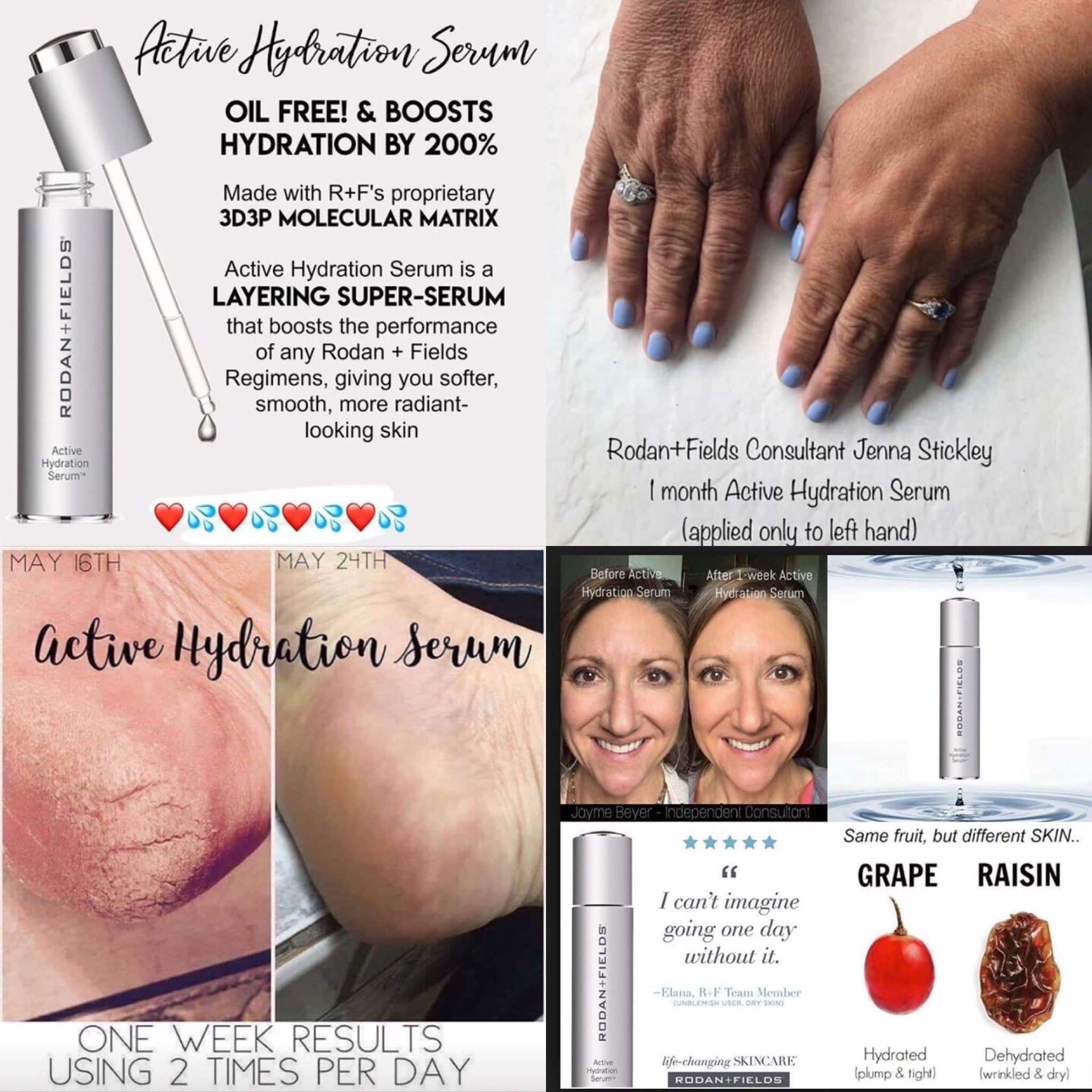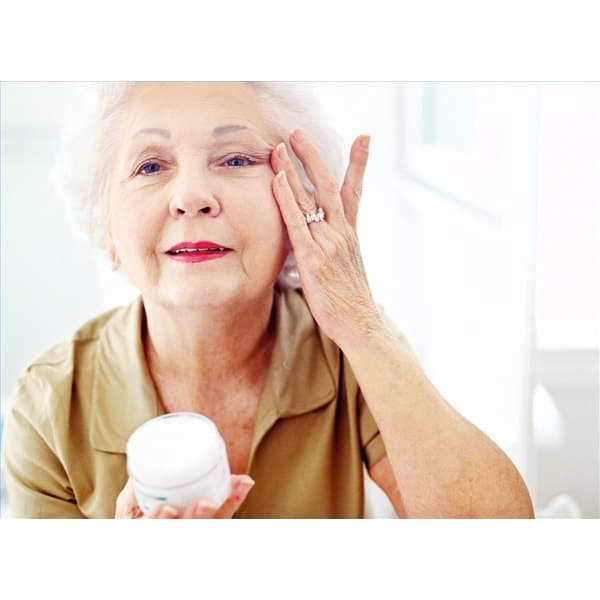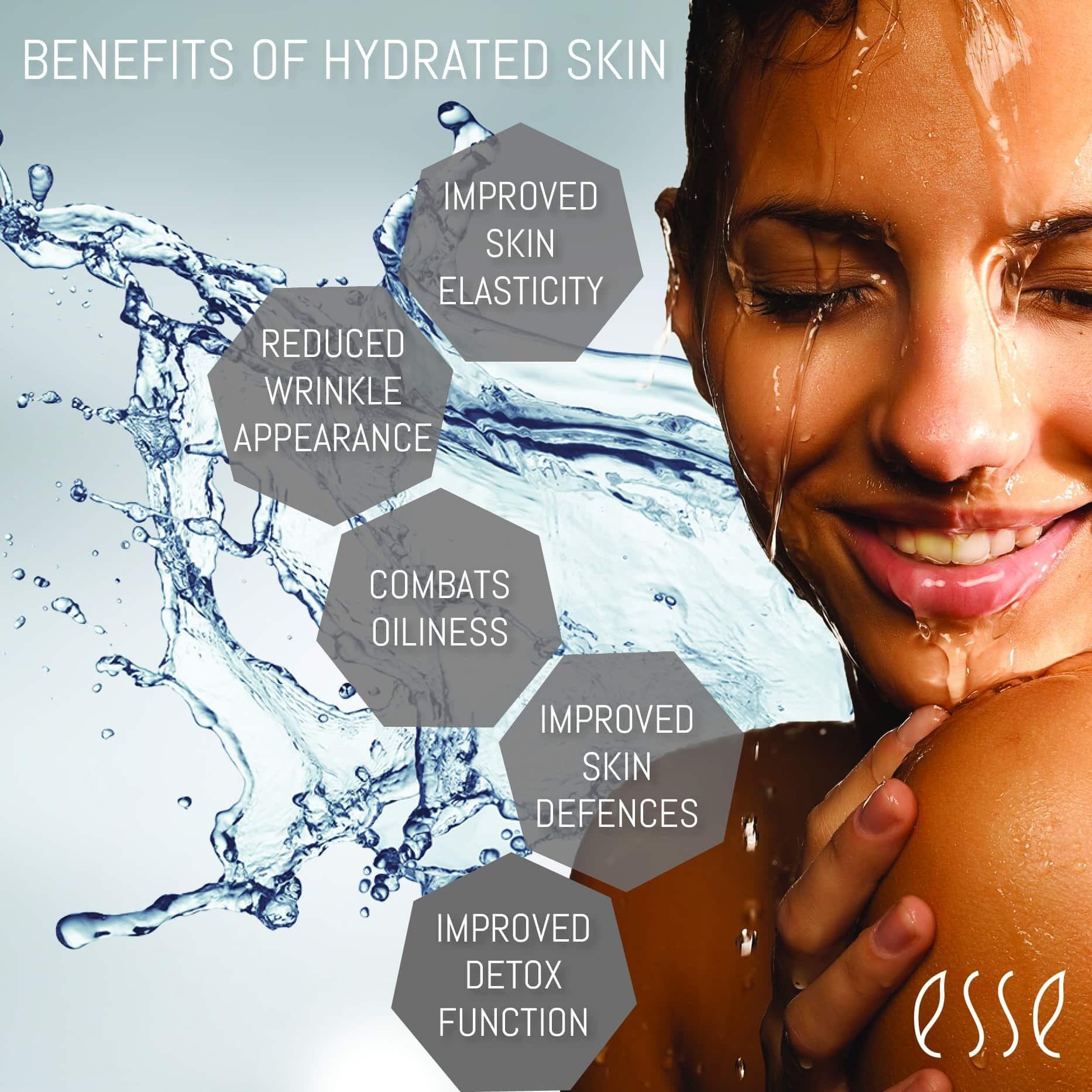If You’re Cream Moisturizeraverse
If feeling greasy is what turns you off about cream moisturizer, experts suggest using oil as a means of locking in hydration. There seems to be a common misconception that oils will leave you feeling like you just ran a marathon in 90-degree weather. However, this notion is simply not true. In fact, there are many oils that are light, easily absorbed, non-comedogenic, and great for daily use.
“The secret is using natural oils,” says Kristina Goldenberg, MD. “Shea butter is one of my favorites. It gives the skin lasting moisture. As someone with dry, sensitive skin, I do not have to worry about an allergy since this is a very gentle product.”
Paul Jarrod Frank, MD, says oils are even better than creams at locking in hydration. “Water dries the skin, but oils and ointments are the most hydrating,” he adds. “Lotions go on easy but still don’t hydrate as well as an oil.”
The idea is that oil is meant to work by repairing your skin’s top-most lipid barrier and locking in moisture, whereas water-based gel moisturizers and serums may evaporate. The issue with oils, however, may lie in those with acneic skin. According to celebrity esthetician Renée Rouleau, oils serve as a breeding ground for bacteria, leading to even more breakouts. In this case, you’ll want to turn to other options .
Apply Hydrating Serums Or Humectants Followed By Moisturizer After Washing
After washing your face and body is the perfect time to hydrate and moisturize. Before applying your moisturizer, try a hydrating serum or humectant. “Humectants hold moisture close to the skin cells, allowing for better absorption, effectively keeping the skin hydrated,” Qazi says. “Some examples of humectants are hyaluronic acid and aloe gel. After using a serum, protect the skin from transdermal water loss by sealing humectants next to the skin with a good moisturizer.”
What Is Hydrated Skin
Its natural to think of water when you hear the word hydration. Rightly so, hydrating your skin means increasing its water content. If your skin is dehydrated, it can appear flaky, dull and dry.
Hydrated skin is smooth, radiant and has an even tone. To achieve this, you need to quench your skins thirst from time to time.
However, people often tend to confuse dehydrated skin with dry skin. Although used synonymously, there is an underlying difference between the two.
Recommended Reading: What Is The Survival Rate For Metastatic Melanoma
Ways To Keep Your Skin Hydrated
There are two main aspects to keeping your skin hydrated. The first is actively hydrating it. This is something you can do by applying a good quality moisturizer, drinking lots of fluids and using a humidifier whenever the air gets a little too dry.
The second is avoiding things that can dry out your skin, such as bright sunlight, harsh skin care products and certain habits and lifestyle factors.
Below, weve shared 12 simple but effective tactics that you can use to promote hydration, avoid dryness and keep your skin looking, feeling and functioning its best.
Can I Naturally Hydrate My Face

Not only can you naturally hydrate your face, but you should. How should you go about hydrating it?
- Drink enough water: First of all, focus on drinking eight eight-ounce glasses of pure water each day. You can’t count coffee or other caffeine-containing beverages because caffeine promotes dehydration by causing the kidneys to work overtime and eliminate water from the body.
- Eat fruits and vegetables: Another way to naturally hydrate your face is to eat plenty of fresh fruits and vegetables since they naturally contain large amounts of water.
- Get enough sleep: You should also ensure that you get seven to eight hours of sleep each night to give your skin time to rejuvenate and repair.
- Apply cool compresses to your face: Cool compresses can tighten the skin, minimizing the appearance of lines and wrinkles, and can also reduce undereye puffiness and even calm skin inflammation.
However, regardless of the ways that you use to naturally hydrate your face, it’s important that you combine these methods with the regular use of high-quality skin care products. Whether you have dark undereye circles or other signs of aging, or you suffer from naturally dry skin, it’s imperative that you stick to a regimen.If you’re not sure what type of skin you have and which products would work best for your skin type, you can see a dermatologist or do research into skin care treatments that are safe and effective for skin that needs hydration.
You May Like: What Happens When You Have Melanoma
If You Still Have Dry Skin Talk To A Dermatologist
Most of the time, you should be able to keep your skin hydrated and prevent dryness using the habits and techniques listed above.
However, if your skin dries out easily, or if you dont see results from these techniques, its best to talk to a dermatologist.
As specialists in skin care, a dermatologist can examine your skin and find out what may cause issues such as dryness.
They can also recommend medications and other products to promote hydration and keep your skin properly moisturized.
Use Hydrating Skincare Products
Water-based creams are recommended if you have dehydrated skin. Products that penetrate through your skin and deliver water are vital if you have dehydrated skin.
According to Dr. Harish, Products containing hydrating agents like glycerin, hyaluronic acid, urea and ammonium lactate can preserve skin hydration.
Look for the following hydrating ingredients:
A. Hyaluronic Acid
Plays an important role in hydrating your skin and maintaining its elasticity . Hyaluronic acids water-binding properties help replenish your skin and also prevents early signs of ageing .
B. Glycerin
A popular ingredient of the beauty industry, glycerin has hydrating properties that can relieve your skin from feeling dry and itchy. This is because glycerin is a humectant. So it works by attracting moisture from the environment onto the surface of your skin .
C. Urea
Another widely used ingredient in the dermatological world, urea loosens and breaks down hardened protein, relieving your skin of roughness and itchiness .
D. Ceramides
These are skin replenishing ingredients, like the cement that supports the bricks of a building. They make up and repair your skins barrier, which prevents water loss and retains moisture .
E. Panthenol
Panthenol is an ingredient that penetrates through the skin and imparts moisture to the cells. It also prevents trans-epidermal water loss. This means that it improves skin barrier functions by stimulating cells that boost the same.
Also Check: What Happens If Squamous Cell Carcinoma Spreads To Lymph Nodes
Ways Drinking Water Helps Improve Skin
Many people underestimate the power of drinking water and the positive affects it can have on your skin and your overall health. Your skin is the largest organ in your body, protecting you, storing lipids and water, preventing fluid loss and serving as thermoregulation. Drinking more water is the most natural way to get that beaming, glowing and healthy skin we all want.
Lets take a look at 7 ways drinking water helps improve skin.
Add A Hydrating Sheet Mask To Your Roster
Adding a hydrating sheet mask into your skincare routine is a convenient way to increase water content in a concentrated manner, says Dr. Hartman. For a one-two punch of hydrating and soothing properties, look for sheet masks that contain ingredients such as hyaluronic acid, aloe, green tea, vitamins A, E, and C, and oat extract.
Read Also: How I Cured My Melanoma Naturally
Exfoliate Effectively Without Dehydrating Your Skin
Exfoliation is a step that happens regularly in a good skincare routine. It is intended to remove the dead skin cells from the skins surface to reveal a brighter complexion from underneath.
But exfoliation can have a dark side, especially if applied recklessly.
As your skin ages, your cellular turnover slows down. This means:
The young skin cells are coming to the surface slower than they were when you were in your 20s.
This causes the mature or dead skin cells on the surface of the skin to make your complexion look dull and sallow because theyve stayed there exposed to oxygenation for a longer time.
So the only logical solution is to over-exfoliate them to death and maintain a glowing complexion, right? Wrong!
The mature skin cells on the skins surface are part of the natural moisturizing factors and are well adjusted to retain more moisture into the skin, so removing them will expose your skin to rapid moisture loss and even more dehydration.
This is why you need to avoid harsh scrubs that contain nut kernels or excessive use of exfoliating acids as some of these are marketed as safe to be used even twice a day which is mindblowing to me. Absolutely do not do this!
Opting for gentle exfoliating acids such as lactic acid, mandelic acid, and exfoliating enzymes and using these no more than 2-3 times a week is the right way to exfoliate, get amazing results, and maintain healthy and happy skin.
RELATED: How To Exfoliate Your Skin
Nix Hot Showers And Baths
On the surface, it may seem like taking hot showers and baths would help quash dehydrated skin , but the opposite is true. Hot showers and baths encourage water to flow out of your skin and evaporate into the shower, therefore dehydrating the skin, says Dr. Green.
The best kinds of showers are short, lukewarm showers, to ensure water stays within the skin. To really lock in that water content, look for ingredients in body washes that will draw water in and amplify the affect of hydration, says Dr. Green. A great ingredient that does this is hyaluronic acid.
Don’t Miss: How To Identify Squamous Cell Carcinoma
Use Milk Compresses For Irritated Skin
Milk has natural anti-inflammatory properties, says Shainhouse. “It also contains lactic acid, a mild, natural exfoliant. To make a milk compress, Cincinnati Health Institute advises soaking a clean cloth in a bowl of cool milk, and holding it in place over any dry areas. Shainhouse recommends using these compresses on your skin for 5 to 10 minutes at a time. Its especially helpful for irritated skin thats itchy, too. Lactic acid can sting cracked skin, though, so use with caution, per Harvard Health Publishing.
RELATED: A Comprehensive Guide to Using Acids in Your Skin-Care Routine
Tone Down Facials Facial Steaming And Hot Baths/showers

Recommended Reading: Preventing Loose Skin During Weight Loss
Eat Foods Rich In Amino
Amino acids are the building blocks of proteins which are vital for a healthy body and delicate skin. Aging brings about a decrease in the natural production of amino-acids so you might want to make up for this with some plant or animal-based proteins. What aging also does is reduce the collagen and elastin levels which are essential for the skins firmness and elasticity. Foods packed with this type of compounds include lean meat, fish, eggs and dairy, beans and peas, walnuts, soy, olive or flaxseed oil.
Use An Overnight Face Mask
Applying a face mask is a great way to add extra hydration into your skin care routine. While there are tons of face masks on the market that help address a number of different skin concerns, youll want to look for options that are formulated with hydrating ingredients.
Seek out formulas with hyaluronic acid or squalane, an antibacterial emollient. The LOréal Paris Revitalift Triple Power Anti-Aging Overnight Mask is formulated with hyaluronic acid and other good-for-skin anti-aging ingredients that wrap very dry skin in moisture at night.
Read Also: How Can I Tell If I Have Skin Cancer
The Jury Is Still Out About Whether Drinking Lots Of Water Helps
Will internal hydration really make a difference in the behavior of your skin? While it certainly wont hurt, Dr. Hellman notes that someone has to be clinically dehydrated for their skin to change from simply drinking a little more H20 every day. She does recommend that people stay hydrated with a proper amount of water, however.
Lekus, on the other hand, wholeheartedly believes in the power of drinking water to benefit dry skin. Studies recommend drinking half your bodyweight in ounces of water every day, she says. If you need to make your water more palatable, infuse it with fruit, or add lemon, lime, cucumber, mint. She also suggests drinking coffee, tea, and soda in moderation since
Final Thoughts On How To Hydrate Your Skin
Hydrating your skin is important for keeping it looking and feeling its best. There are a number of different ways you can do this, and it is important to find one that works best for you. Remember to drink plenty of water, use a humidifier, avoid hot showers, and use a natural moisturizer. And dont forget to take care of your skin from the inside out by eating a healthy diet and maintaining good gut health.
Read Also: What Does Skin Cancer Look Like On Your Leg Pictures
Drink Your Daily Dose Of Water
So often we hear how drinking water is the “secret” to some celebrity’s perennially good looks. While it is certainly true that most celebrities have a bit more help with skin care thanks to top-tier derms and skin care, there is something to be said for getting your daily intake. No, chugging water isn’t going to reverse the clock a decade, but doing so consistently does improve the appearance of the skin. In fact, studies have shown that getting the recommended amount of water for your body increases the dermal layer5, thereby making your skin more hydrated.
Invest In A Humidifier
Many derms swear humidifiers are their secret weapon for dealing with dry skin. These little household tools disperse water back into the aircloser to the ideal indoor humidity range of about 40 to 50%
And in doing so, they are saving you from itchy skin, chapped lips, and thirsty hands in the process. If you don’t have the nifty technology on hand, you can try some DIY methods to increase the humidity in your home.
Don’t Miss: What Stage Is Invasive Squamous Cell Carcinoma
Drink Plenty Of Water
Remember, the skin is an organ like any other. While serums before moisturizers can definitely help to lock in water, sometimes the best way to hydrate the body is simply to drink more water. The U.S. National Academies of Sciences, Engineering and Medicine recommends that adults consume 3.7 liters of fluids a day for men and 2.7 liters of fluids a day for women.
For Best Results Use Moisturizer After Bathing

Moisturizer works well whenever its applied to your skin, but its most effective when its applied just after you take a bath, shower or otherwise wet your skin.
To keep your skin well hydrated throughout the day, try applying moisturizer within five minutes of each time you take a shower, bath or wash your face or hands in the sink.
This helps to lock in the moisture thats still on your skin and maximize your level of skin hydration.
Whenever your skin feels dry, you can splash some water on it in the bathroom, then apply your moisturizer directly to your skin.
Make sure to carefully massage the moisturizer into your skin to ensure its fully absorbed.
Read Also: Can Skin Cancer Spread To Other Parts Of The Body
Moisturizing Vs Hydrating: What’s The Difference
The terms moisturizing and hydrating are often used interchangeably. But are they the same?
“Moisturizing is really focused on the skin barrier itself,” Cameron says. “These products work to seal in the water inside the cell.”
These products contain three basic types of ingredients:
Humectants like glycerin, hyaluronic acid, and urea pull water from both the air and the deeper layers of skin into the stratum corneum to add moisture.
Occlusives like beeswax, soybean oil, and lanolin form a barrier that prevents water from evaporating.
Emollients like coconut oil, shea butter, and colloidal oatmeal add softness to the skin.
The newest generation of moisturizers also add ceramides or other ingredients to repair the lipid barrier and prevent water loss.
Hydration goes beneath the skin’s barrier. It infuses water into the cells to “plump them up,” Cameron says. Sometimes it can be hard to tell the difference because a lot of products incorporate ingredients that both moisturize and hydrate.
Dos And Don’ts Of Skin Hydration
If you’ve ever paid attention to the skin care ads on TV, you’ve likely heard at least one pitch for a product that promises to “hydrate your skin.” But what does that mean? And why does your skin even need hydration?
Hydration refers to water. Your skin needs water to give it strength and elasticity — in other words, to look and feel healthy.
Luckily, you’ve got a built-in barrier to hold in water. The outermost layer of your skin, called the stratum corneum, is made of dead skin cells called corneocytes, stacked like bricks. Fats called lipids act like mortar. This cellular “brick wall” helps to keep the moisture locked inside your cells.
The trouble is that the moisture-locking system doesn’t always work as well as it should.
“Some people’s lipid barrier is more prone to drying out,” says Michael Cameron, MD, assistant professor of dermatology at the Mount Sinai Icahn School of Medicine. âWhen it does dry out, you can end up with scaly or flaky skin.â
Skin can get dehydrated if the cells underneath the barrier lose too much water. “When the water content inside the cells decreases, the cells become shriveled,” he says. As a result, “The skin may look dull, lose its luster, and fine wrinkles can be more noticeable.”
Dryness doesn’t only affect your skin’s appearance. It also can leave it itchy and cracked, which makes it uncomfortable to live with.
Also Check: What Can Be Mistaken For Skin Cancer